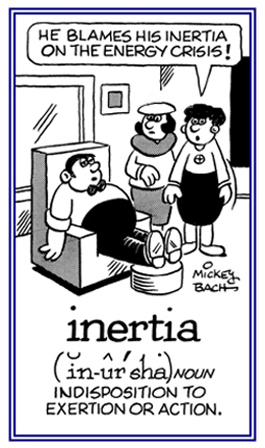art-, arti-
(Latin: skill, handicraft, trade, occupation, art)
1. The inability or unwillingness to move or to act: Karen was told by her fellow worker that it was not a lack of opportunity that hampered her from completing the project but simple inertia.
2. In physics, the tendency of a body to remain at rest or in motion until acted upon by an outside force: The inertia of many astronomical objects have been the same for centuries.
3. Inactivity; inability to move spontaneously; sluggishness: Old age has a strong influence on the inertia of most people. In fact, the older people become, the less inertia they have.
4. Resistance or disinclination to motion, action, or change: The inertia of an entrenched bureaucracy is nothing new.
5. Etymology: used as a term in physics during the 17th century by the German astronomer and physician, Johann Kepler (1571-1630); from Latin inertia, "unskillfulness, idleness"; from iners, inertis, "unskilled, inactive"; from Latin in-, "not + ars, artis, "skill, the method, way, an art, faculty". Used in Modern Latin by Newton (1687).

© ALL rights are reserved.

© ALL rights are reserved.
Go to this Word A Day Revisited Index
2. In physics, the tendency of a body to remain at rest or in motion until acted upon by an outside force: The inertia of many astronomical objects have been the same for centuries.
3. Inactivity; inability to move spontaneously; sluggishness: Old age has a strong influence on the inertia of most people. In fact, the older people become, the less inertia they have.
4. Resistance or disinclination to motion, action, or change: The inertia of an entrenched bureaucracy is nothing new.
5. Etymology: used as a term in physics during the 17th century by the German astronomer and physician, Johann Kepler (1571-1630); from Latin inertia, "unskillfulness, idleness"; from iners, inertis, "unskilled, inactive"; from Latin in-, "not + ars, artis, "skill, the method, way, an art, faculty". Used in Modern Latin by Newton (1687).
The sense of "apathy" was first recorded in 1822.


Go to this Word A Day Revisited Index
so you can see more of Mickey Bach's cartoons.
inertial (adjective)
Relating to the tendency of a body to maintain its status of rest or motion unless it is acted upon by an external force: "Lenora's inertial behavior was a result of her not feeling well and so she didn't want to get dressed and go to school."
inertially (adverb)
A reference to a resistance to change: "Gary told his son to get inertially moving off the couch and texting on his i-phone and to clean up his room."
inertness (s) (noun)
1. Not moving or not able to move.
2. Not readily changed by chemical or biological reaction.
3. Lacking in energy or motivation.
2. Not readily changed by chemical or biological reaction.
3. Lacking in energy or motivation.
nouveau art, art nouveau
1. A French school of art and architecture popular in the 1890s; characterized by stylized natural forms and sinuous outlines of such objects as leaves and vines and flowers.
2. A body of creative artists or writers or thinkers linked by a similar style or by similar teachers in a school.
2. A body of creative artists or writers or thinkers linked by a similar style or by similar teachers in a school.
Strenua inertia. (Latin quote)
Translation: "Energetic idleness; masterly inactivity." -Horace
An oxymoron from Horace telling us that it often takes a lot of work to appear to keep busy doing nothing.
The ability of a material to store heat and to resist temperature changes, dependent on its density and specific heat.
Vires, artes, mores.
Strength, arts, morals.
Motto of Florida State University, Tallahassee, Florida, USA.
vis inertiae (s) (noun)
1. The tendency of a body to resist acceleration: "In physics, vis inertiae is the resistance of a force of inertia; by extension, this may be applied to resistance in matters of social progress or change. It explains why a plan set in motion is difficult to stop, and vice versa.
2. The resistance of matter: "Vis inertiae exists when a body at rest is set in motion, or a body in motion is brought to rest, or when it has its motion changed, either in direction or in velocity."
2. The resistance of matter: "Vis inertiae exists when a body at rest is set in motion, or a body in motion is brought to rest, or when it has its motion changed, either in direction or in velocity."

